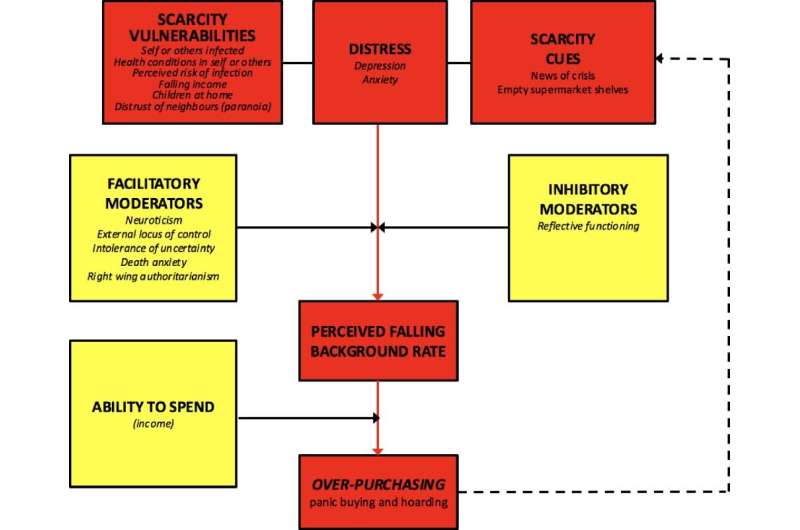#New psychological model predicts who panic-buys during times of crisis

“#New psychological model predicts who panic-buys during times of crisis”

Drawing on animal-foraging theory, a new model predicts psychological factors that may lead to panic buying during times of crisis. The model is largely supported by real-world data from the COVID-19 pandemic. Richard Bentall of the University of Sheffield, England, and colleagues presented these findings in the open-access journal PLOS ONE on January 27.
In the early stages of the pandemic, consumers in several countries around the world engaged in “panic buying” of household items, causing temporary shortages of toilet rolls and other products. Such behavior is typical during times of crisis, but few studies have examined the psychology of crisis-driven over-purchasing.
To better understand this phenomenon, Bentall and colleagues turned to animal-foraging theory, which considers tradeoffs between exploiting familiar local resources and traveling to seek resources of unknown abundance. They used this framework to develop a model that incorporates demographic, situational, and psychological factors to predict which factors lead to over-purchasing.
The researchers then tested the model using data from surveys conducted in 3,066 households in the U.K. and the Republic of Ireland shortly after strict physical distancing measures were first enacted. Participants self-reported their over-purchasing behaviors, as well as income, feelings of neighborhood belongingness, psychological distress, and other factors that might impact purchasing behaviors.
The survey showed that households that engaged in over-purchasing typically bought a wide range of products, rather than focusing on a single category. Over-purchasing was associated with higher income, the presence of children in the household, and a greater degree of psychological distress, threat sensitivity, and mistrust of others.
These findings were largely in line with the model’s predictions. However, there were a few exceptions; for instance, greater neighborhood belongingness was unexpectedly associated with over-purchasing, perhaps because close neighbors talk amongst themselves about observed product shortages.
The researchers suggest that their model could help inform policies to mitigate panic-buying during future crises. Additional research could refine the model and examine it in the context of various types of crises.
The authors add: “Buying excessively and stockpiling is a natural response to a crisis, and can be adaptive if it does not lead to shortages. Governments who wish to avoid the shortages caused by panic buying need to pay attention to the psychology of this phenomenon and the cues that provoke this kind of behavior.”
Richard P. Bentall et al, Pandemic buying: Testing a psychological model of over-purchasing and panic buying using data from the United Kingdom and the Republic of Ireland during the early phase of the COVID-19 pandemic, PLOS ONE (2021). DOI: 10.1371/journal.pone.0246339
Citation:
New psychological model predicts who panic-buys during times of crisis (2021, January 29)
retrieved 30 January 2021
from https://phys.org/news/2021-01-psychological-panic-buys-crisis.html
This document is subject to copyright. Apart from any fair dealing for the purpose of private study or research, no
part may be reproduced without the written permission. The content is provided for information purposes only.
If you liked the article, do not forget to share it with your friends. Follow us on Google News too, click on the star and choose us from your favorites.
For forums sites go to Forum.BuradaBiliyorum.Com
If you want to read more Like this articles, you can visit our Science category.




